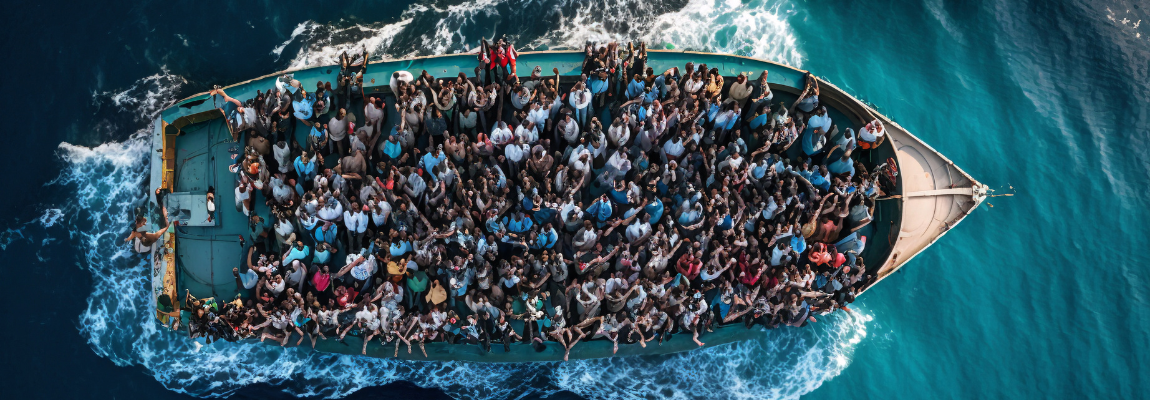Migration: UK government plans to overrule country’s highest court in face of Rwanda defeat
Yola Verbruggen, IBA Multimedia JournalistFriday 24 November 2023

In mid-November, the UK’s Supreme Court unanimously agreed that sending asylum seekers to Rwanda contradicts the country’s obligations under international and domestic law. Now, the government plans to overrule the country’s highest court to get its way.
‘I told parliament earlier today that I’m prepared to change our laws and revisit those international relationships to remove the obstacles in our way,’ said UK Prime Minister Rishi Sunak following the ruling. He vowed to introduce ‘emergency legislation’ to get flights to Rwanda off the ground.
Nicolas Rollason is Chair of the IBA Immigration and Nationality Law Committee and a partner at Kingsley Napley in London. ‘What the UK is trying to do is to impose the will of parliament on the courts,’ he says. ‘But it doesn’t change the fact that tomorrow and next week, Rwanda will still not be a safe country.’
The government’s proposed action in response would constitute a ‘serious challenge to democracy’, believes Rollason. ‘It’s a fundamental constitutional question about the government respecting the judiciary and the decisions of the highest courts in the land on what it can do. If a government can just ignore this and just push ahead, it sets a very bad precedent. It is a very worrying time for the rule of law in the UK,’ he says.
What the UK is trying to do is to impose the will of parliament on the courts. But it doesn’t change the fact that tomorrow and next week, Rwanda will still not be a safe country
Nicolas Rollason
Chair, IBA Immigration and Nationality Law Committee
The UK’s plans involving sending asylum seekers to Rwanda have been the subject of protests and legal proceedings from the beginning, resulting in the last-minute grounding of the first scheduled flight in June 2022 via an intervention by the European Court of Human Rights (ECHR). While initially found lawful by the UK’s High Court, the Court of Appeal later ruled against the Rwanda deal, identifying a risk that asylum seekers could be returned to their home countries, where they could face inhumane treatment – also known as refoulement. The Court of Appeal’s decision has now been confirmed by the Supreme Court.
In its evidence to the Court, the UN Refugee Agency (UNHCR) presented ‘at least 100 allegations of refoulement’ in Rwanda, including since its agreement with the UK. ‘UNHCR recognises that Rwanda has generously provided safe haven to refugees for decades and has made efforts to build the capacity of its asylum system. UNHCR’s position on “safety” in Rwanda pertains to some gaps within the Government of Rwanda asylum system, including its structures and procedures for determining eligibility for refugee status,’ says Maeve Patterson, the UNHCR’s National Spokesperson for the UK.
In response to the Supreme Court judgment, the Rwandan government stated that it rejected the conclusions reached and said that the country takes its ‘humanitarian responsibilities seriously, and will continue to live up to them.’
In its ruling, the Supreme Court stated that sending asylum seekers to Rwanda would be in violation of international as well as domestic law. Sunak’s continued insistence that he ‘will not allow a foreign court to block these flights’ and talk of the UK’s possible departure from the European Convention on Human Rights (ECHR) would thus not change the outcome of such a judgment.
Alex Stojicevic is Newsletter Officer of the IBA Immigration and Nationality Law Committee and co-founder of MKS Immigration Lawyers in Canada. He says that the offshore processing of asylum claims is ‘a very problematic practice that really should not be undertaken’, especially in countries with poor human rights records. ‘The Court ruled that apart from Article 3 of the ECHR – which was found to specifically prohibit the expulsion of asylum seekers to countries where they face the risk of refoulement (direct or indirect) to their country of origin – the same commitment was given effect by multiple international treaties that the UK was a party to,’ he says.
Withdrawal from international treaties that protect human rights would also have wider consequences, including for trade, says Rollason. ‘The UK’s adherence to these international conventions enables it to take part in the international community and they are fundamental to the UK doing business around the world,’ he explains.
While asylum seekers in the UK at risk of being sent to Rwanda may be relieved, their status under the UK Illegal Migration Act remains one of great uncertainty. Under the law – passed in July – anyone arriving in the UK on small boats will be detained and deported to a ‘safe’ third country. While the Court ruled that Rwanda cannot be considered ‘safe’, it didn’t dismiss the notion of sending asylum seekers to a third country. However, no deals currently exist between the UK and other countries.
Meanwhile, migrants keep arriving on small boats. These people will be ‘waiting for this to play out’, says Rollason. ‘The numbers will keep on growing, so the backlog will continue growing. People will potentially sit in detention without their claims being processed. It will just heap misery on misery for people who are arriving in the UK, many of whom will have very strong claims for asylum.’
Austria is reportedly exploring a similar third country deal to that which the UK struck with Rwanda, while Italy recently announced an agreement with Albania, under which the latter will allow the former to manage migrant centres on its land. The UK Supreme Court ruling may provide some indication as to how such deals would fare in court.
Image credit: katrina/AdobeStock.com
